Planning worship?
Check out our sister site, ZeteoSearch.org,
for 20+ additional resources related to your search.
- |
User Links
Person Results
Martin Moller
1547 - 1606 Person Name: Martin Møller Topics: Twenty fifth Sunday after Trinity Sunday Translator of "Afvend fra os, o Herre mild" in Salmebog for Lutherske Kristne i Amerika Moller, Martin, son of Dionysius Moller, mason at Liessnitz (now Kroptädt), near Wittenberg, was born at Liessnitz, Nov. 11, 1547. He attended the town school at Wittenberg and the gymnasium at Görlitz, but was too poor to go to any university. In 1568 he was appointed cantor at Löwenberg in Silesia, but in April, 1572, was ordained as pastor of Kesselsdorf, near Löwenberg. In the autumn of 1572 he was appointed diaconus at Löwenberg, in 1575 pastor at Sprottau, and in July, 1600, became chief pastor at Görlitz. He preached his last sermon, Oct. 30, 1605, and died at Görlitz, March 2, 1606 (Koch, ii. 211, iv. 552, &c).
Moller's hymns appeared in his two very popular devotional books, (I) Meditationes sanctorumpatrum, Görlitz, 1584; pt. ii., Görlitz, 1591, and various later eds. This was mostly made up of meditations from St. Augustine, St. Bernard, and Tauler, selected and tr. into German by Moller. (2) Manuale de praeparatione ad mortem. Görlitz, 1593 [Library of the Prediger-Seminar at Hannover]. Wackernagel, v., Nos. 71-75, gives only 5 hymns under Moller's name. Of these No. 72 ("Heiliger Geist, du Tröster mein") is from “Veni Sancte Spiritus, et emitte " (q.v.), and No. 73, (“Nimm von uns Herr") from "Aufer immensam.” Two versions of the "Jesu dulcis memoria " have also often been ascribed to Moller, viz. "Ach Gott, wie manches Herzeleid", and, with less reason, "O Jesu süss, wer dein gedenkt." [Rev. James Mearns, M.A.]
----John Julian, Dictionary of Hymnology (1907)
Martin Moller
Thomas of Celano
1200 - 1265 Topics: Twenty fifth Sunday after Trinity Sunday; Twenty fifth Sunday after Trinity Sunday Author of "Det snart forvist paa Tiden er" in Salmebog for Lutherske Kristne i Amerika Thomas of Celano was born at Celano in the Abruzzi, and joined St. Francis of Assisi c. 1214. He was commissioned by Gregory IX to write the life of St. Francis: the First Legend, 1229; the Second Legend, 1247; and the Tract on the Miracle of St. Francis a few years later. His Legend of St. Clare was composed in 1255. He was probably among the first band of friars to visit Germany, 1221.
--The Hymnal 1940 Companion
===============================
Thomas of Celano. It is somewhat remarkable that neither the date of the birth nor of the death of this writer, whose name is so intimately associated with the Dies Irae, is on record. He was a native of Celano, a small town near the lake Fucino, in the farther Abruzzo, and hence his name of Thomas of Celano. Several of the inhabitants of this town were driven therefrom by Frederick II. in 1223, and Thomas with the rest. He found his way to Assisi, and became a monk there during the lifetime of St. Francis. The Franciscan Order was established in 1208, Thomas was therefore one of the early students at Assisi. He was subsequently "custos of the convents of Worms, Mentz, and Cologne, and afterwards sole custos of the Rhine districts." The last named appointment he held till 1230, when he returned to Assisi. As intimated above the date of his death is not on record. It is sometimes given as 1255. Thomas also wrote a Life of St. Francis.
--John Julian, Dictionary of Hymnology, Appendix I (1907)
See also in:
Hymn Writers of the Church
Thomas of Celano
Elias Blix
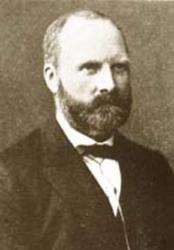
1836 - 1902 Person Name: Blix Topics: Hymns of the Church Year Fifth Sunday after Trinity Sunday; Fifth Sunday after Trinity Sunday High Mass Author of "Med Jesus vil eg fara " in M. B. Landstads Kirkesalmebog og "Nokre Salmar" ved Professor Dr. E. Blix, samt følgende tillæg
Elias Blix
August Hermann Francke
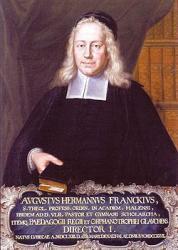
1663 - 1727 Person Name: August Hermann Franke, d. 1727 Topics: Twenty Fifth Sunday after Trinity Author of "Lord, Thou art my Rock of strength" in Church Book Francke, August Hermann, son of Johann Francke, a lawyer in Lubeck, was born at Lubeck, March 22, 1663. He studied at the Universities of Erfurt, Kiel, and Leipzig, graduated M.A. at Leipzig, 1685, and thereafter lectured on Biblical subjects at Leipzig for some time. About Michaelmas, 1687, he went to Lüneburg to work under the pious superintendent C. H. Sandhagen; and there while composing his first sermon (on St. John xx. 31) he underwent that change which made him call Lüneburg his spiritual birthplace. After spending the greater part of 1688 at Hamburg, he stayed two months with P. J. Spener at Dresden, and then returned about Lent, 1689, to Leipzig, where he resumed his Biblical lectures until the old orthodox party procured an edict forbidding them in the beginning of 1690. On March 10, 1690, he received a call to become diaconus of the Augustine Church at Erfurt, and there, by his stirring exhortations to renewal of heart, living faith and holy life, he drew many, even Roman Catholics, around him, but by a combination of the old orthodox Lutherans with the Romanists he was expelled from Erfurt, Sept. 27, 1691. After a lengthened visit to P. J. Spener, then Probst of St Nicholas's Church, Berlin, he was appointed by the Elector of Brandenburg, Dec. 22, 1691, as professor of Greek and the Oriental languages, and in 1698 ordinary professor of Theology in the University of Halle; being also appointed in 1691 preacher at St. George's Church in Glaucha (suburb of Halle), a post which he exchanged in 1715 for the pastorate of St. Ulrich's, Halle. After his left side was paralysed in Nov. 1726, he patiently endured much suffering till his death on June 8, 1727, at Halle ( Koch , iv. 305-322; Allgemeine Deutsche Biographie, vii. 219-231).
Francke was the spiritual son of P. J. Spener, and became one of the leaders in the " Pietistic" movement which so powerfully influenced Germany, 1680-1750, raised the tone of the community after the depression of the Thirty Years' War, revived the educational system, began systematic provision for the poor, and refined and purified domestic life. Francke was the spiritual leader and teacher, and under him and the band of professors that gathered to Halle, Halle became the headquarters of Pietism. During his time Halle sent out some 6000 graduates in theology, men imbued with his spirit, good exegetes, and devoted pastors, who spread their doctrines all over Germany, and in the early decades of the 18th cent, occupied a majority of the pulpits.
The extensive buildings at Halle, which now bear the title of the "Francke Institutions," are a monument of his simple faith and philanthropic zeal. He began at Easter, 1695, by opening a room in his house for instructing the poor children of Glaucha, with a capital of about thirteen shillings. About Whitsuntide, 1695, were the beginnings of the Paedagogium, 1697 of the Latin School, 1698 of the bookselling and apothecary businesses, 1705 of the mission to the East Indies, 1710 of the Bible Society. On a place formerly occupied by beer and dancing gardens, the foundation stone of the great Orphanage was laid July 13, 1698, in a spirit of humble faith in God and fervent prayer, trusting to Him for the means to pay for the work as it progressed; and week by week as they were needed the supplies came in from far and near. In this work, as in regard to his sermons and lectures, Francke had great opposition to meet, but the Commission of Enquiry which his enemies procured resulted in a cabinet order of 1702, which is the Charter of his Institutions. In 1727 there were 134 orphans in the orphanage; and besides these 2207 scholars in the various training schools, of whom some 360, as well as 225 poor students, received daily rations; while in 1863 the value of the buildings was about £45,000., and nearly 3500 scholars received instruction.
Distinguished as a professor, as a philanthropist, as a pastor, and as a preacher of gospel simplicity and soul-stirring earnestness, Francke was not prolific as a hymnwriter. Only three hymns are known by him, two of which are:—
i. Gottlob em Schritt zur Ewigkeit. New Year, first published in his Schrifftmässige Anweisung recht und Gott wolgefällig zu beten, Halle, 1695, p. 534, in 12 st. of 7 l., as a "Morning and Evening" hymn, entitled "The Voice of the Bride (‘When shall I come and appear before God?’), which she raises as often as she completes a step of her mortal life; and may be used by an upright and believing soul instead of the [usual] morning and evening hymn, as also at other times."
Reprinted in the Geistreiches Gesang-Buch, Halle, 1697, p. 294, Freylinghausen's Gesang-Buch, 1704, &c, and is No. 623 in the Unverfälschter Liedersegen 1851.
According to Koch, viii. 176-179, it was written immediately after his expulsion from Erfurt, Sept 27, 1691, while on his way to his mother's house at Gotha, and "in the experience of the overflowing consolation of the Holy Spirit." In the spirit of his favourite motto, "Quocunque die ante aeternitatem uno stamus pede," and based on 2 Cor. v. 6 and Rev. xxii. 17-20, it is modelled on a hymn by J. V. Andreä, 1636.
"Gottlob ein Schritt zur Ewigkeit
Ist abermals vorbei."
Koch adds that in his lifetime Francke found cases where this hymn had been blessed, that two days before his death he caused the hymn to be read to him, and said, "My faithful Jesus, I have given myself to Thee, soul and body that is sure;" and that on the day on which he died, June 8, 1727, this hymn was one of those sung at the choir meeting at Herrnhut.
The translations in common use are :—
1. Thank God, that towards eternity, a full and good translation by Miss Winkworth, in her Lyra Germanica, 2nd series, 1858, p. 9. In 1860, 1 l. 1-4 of st. i., iv., vi., viii., greatly altered, and beginning, "Bless God, that towards eternity," were included as No. 74 in the American Episcopal Hymns for Church and Home.
2. Oh wouldst Thou in Thy glory come, a translation of st. iv., vii.-xi., founded by Miss Winkworth on her 1858 version, and given as No. 173 in her Chorale Book for England, 1863.
Other translations are: (1) "Another step is made with God," in the Supplement to German Psalmody, ed. 1765, p. 50. Previously in Select Hymns from German Psalmody, Tranquebar, 1754, p. 79. (2) "Thank God! towards Eternity," by J. Gambold, as No. 626 in pt. i. of the Moravian Hymnbook, 1754 (1886, No. 1232). (3) "Thank God! another stage of time," by Dr. H. Mills, 1856, p. 227.
ii. Was von aussen und von innen. Cross and Consolation. A fine hymn of trust in God, founded on Ps. lxii. 5-8. Written in memory of Eleonore, neé Kubitz, wife of J. H. Michaelis, professor at Halle, and appended to the funeral sermon preached by Francke on Ps. lxii. 2, in St. George's Church, Glaucha, Nov. 1, 1711. Included as No. 500 in Freylinghausen's Neues geistreiches Gesang-Buch, 1714, in 9 st. of 8 l., and recently as No. 2250 in Knapp's Evangelischer Lieder-Schatz, 1837 (1865, No. 1997). Lauxmann, in Koch, viii. 508-512, speaks of this lady as one who suffered severe afflictions, but "what from without or from within pressed on her soul she bore in quiet waiting on the help of the Lord, of Whom she could at last gratefully say 'He hath done all things well.'" Lauxmann adds, "This hymn is also a beautiful clear mirror of Francke's own thought and conversation, heart and life experiences." In his Segensvolle Fussstapfen, 1709, he was able already to relate thirty instances in which the Lord had enabled him to receive, exactly at the time when he needed it, pecuniary help in answer to his prayers during the building and conducting of the great Orphanage at Halle.
Of this hymn (which should be read with the history of his great work at Halle) the only translation in common use is:—
What within me and without, a good and full translation by Miss Winkworth in the first edition of her Lyra Germanica, 1855, p. 126 (st. iii. being added in the 2nd ed., 1856), and thence as No. 139 in her Chorale Book for England, 1863. With the altered first line, "Lord, Thou art my Rock of strength," three centos are in American common use:—
1. St. ii., iv., vii., ix. in Boardman's Selections, Philadelphia, 1861.
2. St. ii., vii., ix. in the Pennsylvania Lutheran Chorale Book, 1868, Dutch Reformed Hymns of the Church, 1869, and Bichards's Collection, 1881.
3. St. ii., iv., ix. in Robinson's Songs for the Sanctuary, 1865, and the Hymns & Songs of Praise, N. Y., 1874. [Rev. James Mearns, M.A.]
--John Julian, Dictionary of Hymnology
August Hermann Francke
Wilhelm Andreas Wexels
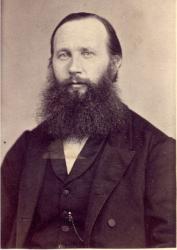
1797 - 1866 Person Name: Wexels Topics: Fifth Sunday after Trinity Sunday Author of "Uværdig er jeg, Herre" in Salmebog for Lutherske Kristne i Amerika Wexels, Wilhelm Andreas. (Copenhagen, Denmark, March 29, 1797--May 14, 1866, Oslo, Norway). Lutheran. After studies in Copenhagen and Christiana (Oslo), became catechist and curate of Our Savior's Lutheran Church in Christiana. Preached against the inroads of rationalism, emphasizing the need for spiritual revival. Church historians claim that his ministry was the turning point in the Church of Norway. Failed in his attempt to give Norway a hymnal, but many of his hymns survived.
--J. Irving Erickson, DNAH Archives
Wilhelm Andreas Wexels
Birgitte K. Boye
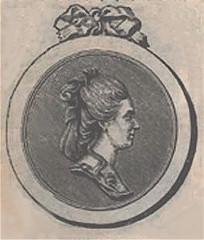
1742 - 1824 Person Name: Birgitte Boye Topics: Fifth Sunday after Trinity Sunday Author of "Jesus græd, Fald paa mit Hjerte" in Salmebog for Lutherske Kristne i Amerika Birgitte was born on March 7, 1742, in Gentofte, Denmark. She was the daughter of Jens Johansen. Boye married a supreme court judge in Copenhagen, Denmark. She found time to study German, French and English and translated hymns into Danish from these languages. As a hymnist, she was involved with Guldbergs og Harboes Psalmebog (Ove Guldberg’s and Ludvig Harboe’s Psalter), to which she contributed 146 hymns. She also produced "national dramatic writing." She died on October 17, 1824.
Sources: Julian, p. 1001 & Stulken, p. 145
Birgitte K. Boye
Bernhard Severin Ingemann

1789 - 1862 Person Name: Bernh. S. Ingemann Topics: Syttende Søndag efter Trefoldigheds Fest Til Aftengudstjeneste; Seventeenth Sunday after Trinity Sunday; Second Sunday in Advent; Femte Søndag efter Hellig 3 Kongers Dag Til Aftengudstjeneste - Til Sekund Tekstrækkes Epistel; Femte Søndag efter Hellig 3 Kongers Dag Til Aftengudstjeneste - Til Sekund Tekstrækkes Epistel; Fifth Sunday after Epiphany; Fifth Sunday after Epiphany; Sjette Søndag efter Hellig 3 Kongers Dag Til Aftengudstjeneste; Sixth Sunday after Epiphany; Skjærtorsdag Til Aftengudstjeneste - Til Tredje Tekstrækkes Lektie; Maundy Thursday; Fifth Sunday after Easter; Pentecost; Pentecost; Syttende Søndag efter Trefoldiheds Fest Til Aftengudstjeneste; Seventeenth Sunday after Trinity Sunday; Åttende Søndag efter Trefoldiheds Fest Til Aftengudstjeneste - Til Sekund Tekstrækkes Epistel; Eighteenth Sunday after Trinity Sunday; Helliges Samfund; Holy Society; Pilgrimsvandring, de Kristnes; The Christian Pilgrimage; Femte Søndag efter Paaske Til Høimesse -Til Anden Tekstrækkes Evangelium; Anden Pinsedag Til Aftengudstjeneste - Til Anden Tekstrækkes Epistel; Anden Søndag I Advent Til Aftengudstjeneste Author of "En Gud og alles Fader!" in Salmebog for Lutherske Kristne i Amerika Ingemann, Bernhardt Severin, was born at Thor Kildstrup, Island of Falster, May 28, 1789. From 1822 to his death in 1862, he was Professor of the Danish Language and Literature at the Academy of Sorö, Zealand, Denmark. He was a poet of some eminence. His collected works were pub, in 1851, in 34 volumes. Seven of his hymns translated into English are given in Gilbert Tait's Hymns of Denmark, 1868. The only hymn by him in English common use is:—
Igjennem Nat og Traengael. Unity and Progress. It is dated 1825, and is given in the Nyt Tillaeg til Evangelisk-christelig. Psalmebog, Copenhagen, 1859, No. 502. In its translated form as "Through the night of doubt and sorrow," by the Rev. S. Baring-Gould, it has become widely known in most English-speaking countries. The translation was published in the People's Hymnal, 1861. It was greatly improved in Hymns Ancient & Modern, 1875, and has been specially set to music by several composers.
--John Julian, Dictionary of Hymnology (1907)
Bernhard Severin Ingemann
James Walch
1837 - 1901 Topics: Fifth Sunday after Easter; Sixth Sunday after Easter; First Sunday after Trinity; Ninth Sunday after Trinity; Christian Life and Hope The Walk of Godliness: Christian Resolve and Holiness; Christian Life and Hope The Walk of Godliness: Christian Resolve and Holiness Composer of "EAGLEY" in Evangelical Lutheran hymnal James Walch was a musician and composer, born near Bolton, Lancashire, England in 1837. He spent his early life in the town and was organist in several churches there, including the parish church of St George’s. From 1870-1877, he was conductor for the Bolton Philharmonic Society. He also composed at least four published hymn tunes, the best known of which is called “Tidings”. Written in 1875, it’s usually used as the tune to a hymn called “O Zion Haste”.
James Walch was a musical instrument dealer by trade, and moved to Barrow-in-Furness in 1877. He later moved to Llandudno Junction in North Wales, where he died in August 1901 and was buried locally. His wife later donated money to pay for the organs in two local churches, St Paul's Llandudno and All Saints Deganwy, in his memory.
Three decades later, an article in the London Gazette reported on a dispute arising from his will, and mentioned that he had a son, Harry West Walch, who was a pianist and lived in Hereford.
St Paul's Church, Llandudno newsletter; used by permission of Christ Dearden (Walch's wife paid for the organ at St. Paul's Church)
James Walch
C. J. Boye
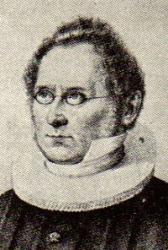
1791 - 1853 Person Name: Casper Boye Topics: Fifth Sunday after Trinity Sunday Author of "Saa vidt som Solens Straaler stige" in Salmebog for Lutherske Kristne i Amerika Caspar Johannes Boye was born in Kongsberg, Norway in 1791. He studied both law and theology at the University of Copenhagen, became a teacher and later served as rector in Søllerød, Helsingørand and Copenhagen. He died in 1853.
See also in:
Wikipedia
C. J. Boye
Johann Heinrich Schröder
1667 - 1699 Person Name: Joh. Schrøder Topics: Tredje Søndag efter Trefoldigheds Fest Til Aftengudstjeneste; Third Sunday after Trinity Sunday; Third Sunday in Advent; Tredje Søndag efter Hellig 3 Kongers Dag Til Høimesse -Til Tredje Teksxtækkes Evangelium; Third Sunday after Epiphany; Første Søndag i Faste Til Høimesse; Første Søndag I Faste Til Aftengudstjeneste - Til Tredje Tekstrækkes Lektie; First Sunday in Lent; First Sunday in Lent; Second Sunday in Lent; Tredje Søndag I Faste Til Aftengudstjeneste - Til Tredje Tekstrækkes Lektie; Third Sunday in Lent; Fifth Sunday after Easter; Sjette Søndag efter Trefoldiheds Fest Til Høimesse -Til Tredje Teksxtækkes Evangelium; Sixth Sunday aftet Trinity Sunday; Fjortende Søndag efter Trefoldiheds Fest Til Aftengudstjeneste; Fourteenth Sunday after Trinity Sunday; Jesus, vor Seierherre; Jesus, our Lord of Hosts; Anden Søndag I Faste Til Høimesse -Til Tredje Teksxtækkes Evangelium; Femte Søndag efter Paaske Til Høimesse -Til Anden Tekstrækkes Evangelium; Tredje Søndag I Advent Til Høimesse -Til Anden Tekstrækkes Evangelium Author of "Jesus, giv Seier! Livs-Fyrste og Kilde!" in Salmebog for Lutherske Kristne i Amerika Schröder, Johann Heinrich, was born Oct. 4,1667, at Springe (Hallerspringe) near Hannover. He studied at the University of Leipzig, where he experienced the awakening effects of A. H. Francke's lectures. In 1696 he was appointed pastor at Meseberg, near Neuhaldensleben; and in the registers there records of himself (writing in the third person), " 1696, on the 17th Sunday after Trinity, viz. on Oct. 4, on which day he was born, with the beginning of his 30th year, he entered on the pastorate of this parish." He died at Meseberg, June 30, 1699 (Koch, iv., 381; Blatter für Hymnologie, 1883, p. 192, &c).
Schröder is best known by the four hymns which he contributed to the Geistreiches Gesang-Buch, Halle, 1697; and which are repeated in the Geistreiches Gesang-Buch, Darmstadt, 1698; and in Freylinghausen's Gesang-Buch, 1704. They are very good examples of the early hymns of the Pietists, being genuine and earnest outpourings of Love to Christ, not unmixed with Chiliastic hopes for the victory of Zion and the overthrow of Babylon. In the same books are two hymns by his wife (Tranquilla Sophia née Wolf), who died at Meseberg, April 29, 1697.
Two of Schröder's hymns have passed into English, viz.:—
i. Eins ist noth, aoh Herr, dies eine. Love to Christ. This is included in the Geistreiches Gesang-Buch, Halle, 1097, p. 505, in 10 stanzas of 8 lines, entitled, "One thing is needful. Luke x. 42. Jesus, Who of God is made unto us wisdom, and righteousness, and sanctification, and redemption. 1 Cor. i. 30."
Its popularity has been due, not only to its own beauty and power, but also to the taking character of the melody to which it is set. This is by J. Neander, in his Bundes Lieder, Bremen, 1680, as the melody of Grosser Prophete; and was altered in Freylinghausen to suit Schroder's hymn. The full form from Freylinghausen is in Mercer's The Church Psalter & Hymn Book, and there called Landsberg. The second part is given in the Bristol Tune Book as Ems. A greatly altered form, as Ratisbon, has passed through W. H. Havergal's Old Church Psalmody into the Irish Church Hymnal, the Scottish Presbyterian Hymnal and others.
The translation in common use from Schröder is:—
One thing's needful, then, Lord Jesus. This is a good and full tr., by Miss Cox, in her Sacred Hymns from the German, 1841, p. 137. Other translations are:—
(1) "One thing is needful! Let me deem." By Miss Winkworth, 1855, p. 183. (2) "One thing's needful:— this rich treasure." By Dr. H. Mills, 1856, p. 92.
ii. Jesu, hilf siegen, du Furste des Lebens. Christian Warfare…It is said to have been written, in 1696, as a companion to his wife's hymn, "Trautster Jesu, Ehrenkonig". It was accused of Chiliasm, by the Theological Faculty of Wittenberg, but still holds an honoured place in German collections. The translations are:—(1) "Jesus, help conquer ! Thou Prince everliving." By Dr. H. Mills, 1856, p. 126. (2) "Jesus, help conquer. Thou Prince of my being." By Miss Manington, 1863, p. 2.
The hymn beginning, "Jesus, help conquer! my spirit is sinking," by Miss Warner, in 6 stanzas, in her Hymns of the Church Militant, N. Y., 1858, p. 161, borrows little more than the first line from the German. It is repeated in Boardman's Selection, Philadelphia, 1861, No. 463. [Rev. James Mearns, M.A.]
--Excerpts from John Julian, Dictionary of Hymnology (1907)
Johann Heinrich Schröder


 My Starred Hymns
My Starred Hymns


